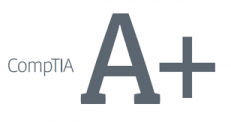Cloud, security, data management, etc., are some of the core technologies that enable complete digital transformation. To maintain this and keep it in working condition, professionals need to undergo CompTIA training.
Cloud, security, data management, etc., are some of the core technologies that enable complete digital transformation. To maintain this and keep it in working condition, professionals need to undergo CompTIA training. This makes them become problem solvers. The CompTIA A+ certification can thus be said to be a launching pad for IT professionals who wish to make a mark in the digital world.
Despite being an entry-level certification course designed to serve the purposes of candidates who want to specialize in computer service, it is considered to be:
- The only credential that have a strong performance-based backing,
- Universally accepted and trusted by millions,
- The go-to person in technical support roles and endpoint arrangement,
- Validation of core abilities and skills that are commonly demanded in the workplace.
CompTIA training exams
There are two exams in which every candidate opting to study CompTIA A+ courses need to pass. These exams are known as Core 1(220 to 1001)and Core 2(220 to 1002). The exams generally contain multiple-choice questions that are traditional, situational, and identification types. The syllabus includes the following aspects:
- Baseline security skills,
- Configuration of cloud-based or SaaS and client-based software,
- Problem-solving and troubleshooting of core services, supporting challenges and applying best practices to enable scripting, documentation, and change management,
- Basic networking and IT infrastructure support,
- Support and configure hardware related to mobiles, PCs, and IoT,
- Basic data recovery and backup methods,
- Implementing best management practices and applying data storage.
Skills that the CompTIA validate
Various skills can be validated using the CompTIA A+ courses and certifications. They include:
- Hardware wherein hardware components can be identified, used and connected,
- Networking wherein the candidate learns about the different types of networks like Wi-Fi, SOHO, TCP/IP, etc.,
- Installation and support for various OS like Windows, Mac OS, Linux, etc., including client and command line support,
- Software troubleshooting for both mobiles and PCs along with app security support,
- Security wherein the weaknesses and vulnerabilities in the network connections and attached devices are identified and blocked,
- Configuration of hardware devices like laptop, mobiles, etc.,
- Networking issue troubleshooting,
- Cloud computing and client-side virtualization etc.
Mastering the above skills as taught in CompTIA training makes a candidate eligible for such jobs as:
- Service desk analyst,
- Help desk technician,
- Technical support specialist,
- Field service and data support technician,
- Desktop support admin,
- End-customer computing technician.
This certification is sponsored by CompTIA, and it needs to be renewed every three years. This renewal also requires the payment of the predetermined fees and retaking the test. But for taking this test, a candidate needs to have a minimum of 6 months job experience as a service technician.
The CompTIA certifications are generally basic and are not product specific. That is why today, almost all entry-level positions, including the help desk positions, service centers, etc., require this certification to apply for these job openings.









*********2@apklamp.com
выфвф